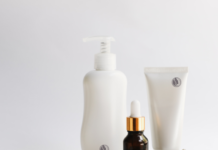
Sweating is a natural process, it is the fundamental physiological response to the rise in body temperature due to various factors such as heat, physical activity or pyrexia (fever). Heat loss in the form of evaporation of the sweat glands is essential for thermoregulation during exercise, exposure to environmental heat conditions, especially when the temperature of the environment is higher than that of the skin. Sweating is very often also stimulated by emotional stress.
In most cases, sweat appears in the armpits, on the hands or on the face, sometimes causing visible signs, such as wet areas on clothes, and unpleasant smells due to the bacteria that metabolize it.
Excessive sweating of the armpits and hands also creates discomfort in social relationships. Often resorting to cosmetic products that can reduce or block perspiration, but they must be considered the last card to play because the benefits that derive from their use are the result of a forced reduction of sweat.
By itself, the sweat produced by the sweat glands in our body is odorless. They are the bacteria that, by activating in contact with it, could generate a bad smell. Bacteria are normally present on our skin in the skin microflora, which is fundamental for the protection of our skin from external agents, among which there are also pathogenic germs. As temperatures rise, therefore, sweating will increase which will activate the bacteria present in the skin microflora.
There are some small basic tricks that minimize the risk of bad smells forming. First of all, personal hygiene: it is a good rule to wash the armpits with soap and water, but not an aggressive soap that would destroy all the skin microflora, and then apply a deodorant that will cover any bad smells that could form during the day. Do not apply mail to the deodorant without first having washed your armpits.
Another good habit is to choose breathable clothing, always preferring cotton and wool and reducing the use of synthetic fibers. This allows the oxygen contained in the air to reach the armpits, reducing the onset of bad smells. The alternative are sweat absorbent pads, which prevent the formation of stains on clothes and must be changed often during the day.
If we can manage sweating without blocking it with salt-based antiperspirants such as aluminum or zirconium, we can not alter the physiological cooling cycle of the body. In case we have to resort to antiperspirants we keep in mind that they should not be applied on damp skin, therefore not immediately after a shower; it is preferable to wear them in the evening when the sweating is less; should be applied a maximum of a few times a week and preferably in cream.
Another speech is the excessive sweating of the hands, which can also be due to reasons of stress, embarrassment and hereditary factors. Since the handshake is the most common greeting, excessive sweating of the hands often causes shame.
There are some natural remedies that can help mitigate this phenomenon. The most important thing, as always in the world of cosmetics, is to find 10/15 minutes for yourself and perform a daily hand bath.
The best choice is sage, with which to prepare an infusion in which to dip your hands for 10 minutes. In addition to absorbing sweat, sage releases a pleasant scent on the skin. Alternatively, it is possible to carry out a hand bath based on lemon and lavender essential oils by pouring two drops of each essential oil into a bowl of cold water and then carrying out the hand bath. Two other more classic possibilities are the water and baking soda or water and apple cider vinegar. During the day, if the hands sweat too much, we can apply talcum powder or rice starch.
To obtain a correct thermoregulation of our body, even in the hottest periods of the year, it is essential to practice motor activity. Continuing to play sports allows our body to get used to maintaining the right thermoregulation without having sweating peaks, but a milder but constant sweating. Another fundamental factor is the gasoline that we put into our body, i.e. the diet, which must be adapted to the season to the extent that it satisfies the body’s complete need without exceeding in foods and drinks that promote excessive sweating.






































